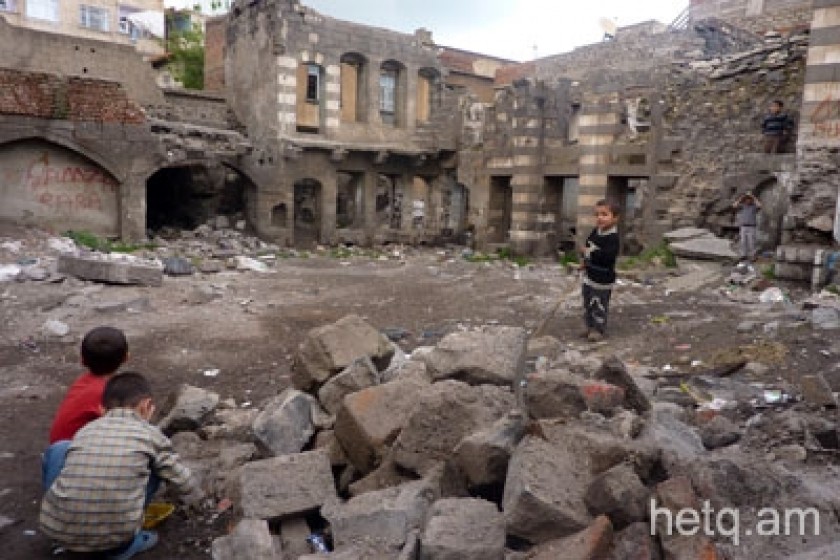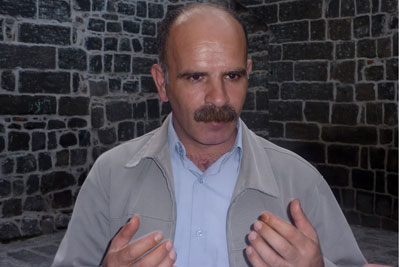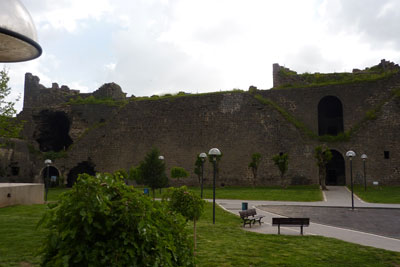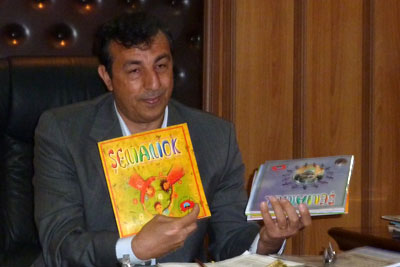
Diyarbekir's Kurdish Mayor - "We welcome back all former residents"
Aram Khachik, or as he’s locally known, Recep, is one of the few Armenians who doesn’t fear proclaiming his national identity.
Our group of journalists from Armenia and Turkey met him at the Armenian Catholic Church in Diyarbakir now undergoing renovation. Aram serves as a security guard at the site.
Aram’s father is Armenian, his mother a Muslim. The man told us he feels like an Armenian in his soul. He has five kids; two with names of his Armenian forbearers – Khachik and Vazken.
 Recep says he gave himself the name of Aram. He told us that there are three other Armenian families in Diyarbakir but that they don’t profess the fact.
Recep says he gave himself the name of Aram. He told us that there are three other Armenian families in Diyarbakir but that they don’t profess the fact.
Diyarbakir Mayor Osman Baydemir told us that there aren’t any statistics regarding Armenians in the area.
He’s a Kurd and belongs to the pro-Kurdish Peace and Democracy Party. Baydemir claims that he wants to restore the multi-cultural nature of the town.
A municipal tourism brochure states that Diyarbakir, “The City of Dreams”, once boasted 26 separate cultures – Kurdish, Turkish, Armenian, Arab, Assyrian, Laz, Yezidi and others.
 There’s 5 kilometers of a stone fortification wall, with 82 towers, that surrounds the town.
There’s 5 kilometers of a stone fortification wall, with 82 towers, that surrounds the town.
Mayor Baydemir told us that he bemoans the fact that Diyarbakir has lost its multi-cultural flavor due to the policies of the Turkish state.
“After they were removed we lost our peace and grew poorer,” Baydemir said, adding that the town, in terms of culture and architecture, is just as Armenian or Syrian as it is Muslim.
“The doors to Diyarbakir are open to all former residents who wish to return,” the mayor claimed, noting that the municipality was seeing to it that all requisite conditions be created to welcome people back.
He pointed to the renovations to the St. Giragos Church and the Armenian Catholic Church as tangible proof.
But the town has seen better days economically. The municipal budget in 2010 was 60 million Euros. Istanbul’s budget is 17 billion Euros.
 We then met with Abdullah Demirbas, the Kurdish District Leader of the Sour neighborhood.
We then met with Abdullah Demirbas, the Kurdish District Leader of the Sour neighborhood.
He’s the one who launched municipal services in a variety of local languages, including Armenian.
Demirbas was convicted of violating the Turkish constitution, but he continues to publish booklets and other materials in languages other than Turkish.
The Sour District Administration published a book of fables in Armenian and Turkish for children. It’s said to be the first case of a Turkish municipality publishing an Armenian book.
Demirbas says that one of the fables included in the book was Hovhannes Toumanyan’s “A Drop of Honey”.
He says that this selection wasn’t coincidental since the fable deals with reconciliation.
There’s also a tourist brochure in Armenian about the town and a biannual student paper published in six languages, including Armenian.
The mayor has been taken to court on 23 separate occasions and has spent almost six months in jail, but he says the struggle for democracy in Turkey will continue.
Demirbas believes that the cause of most of the conflict in Turkey is the state’s policy on “One nation, one culture”.
“We believe in diversity. Not everyone here is Muslim. I want to be an equal citizen of Turkey despite the fact that I am not Turkish. It’s the same for Armenians, Yezidis and Assyrians. I pay taxes and have served in the army. I want to be a part of the decision-making process,” said the Sour district head.
 Videos
Videos Photos
Photos




Comments (1)
Write a comment